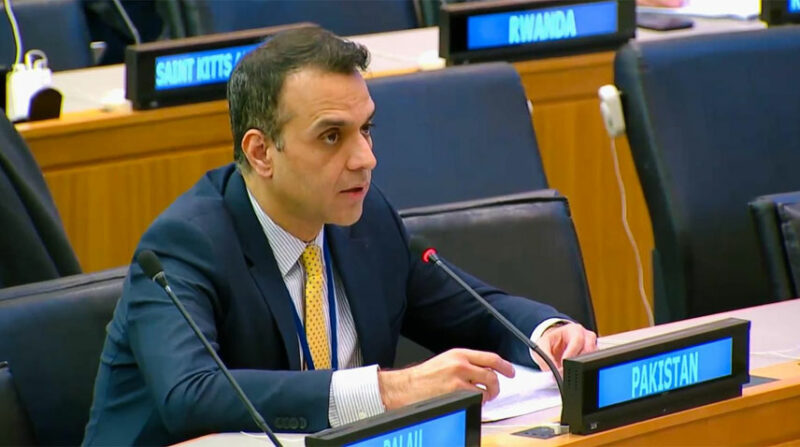NEW YORK: Pakistan has extended its full support to the UN Secretary General in his call for the reform of the international financial architecture to make it more equitable and responsive to the needs of the developing world, believing it to be critical for the implementation of SDG 2 to end world hunger.
Ambassador Usman Jadoon, Deputy Permanent Representative of Pakistan to the United Nations, pledged the support while speaking at the UN ECOSOC Youth Forum on the subject of “Feeding the Future: Youth and Sustainable Food Systems for All” at the UN headquarters.
He said Pakistan expected to be automatically included in any mechanism set up for international support due to the massive pandemic and climate impacts it suffered in recent years.
“Yet, we were deeply disappointed to discover that we were neither eligible for the IMF “food shock window”, nor its Poverty Reduction and Growth Trust (PRGT),” he said.
Ambassador Jadoon highlighted the need for concerted international efforts to establish resilient and sustainable food systems that can withstand shocks and disruptions in light of the increasing vulnerability of global food systems to a multitude of challenges.
He warned that the world was facing a convergence of crises, from conflicts to climate change, and from supply chain disruptions to economic contractions, which posed significant threats to the ability of existing food systems to provide nutritious, safe, and affordable diets for all.
The Deputy Permanent Representative said that as the fifth most populous country in the world with a significant youthful population, Pakistan recognized the critical importance of safeguarding food systems for future generations.
He said that agriculture was the backbone of our economy, contributing substantially to its GDP and employing a significant portion of its labor force. He said that Pakistan understood firsthand the impact of external shocks on food production and availability.
Ambassador Usman Jadoon recalled one of history’s most devastating floods that Pakistan experienced in 2022, which destroyed 4.4 million acres of standing crops, and said that the catastrophe led to a stark realization of the extreme vulnerability of food systems and the pressing challenges that climate-vulnerable countries like Pakistan faced.
He said that despite its considerable potential in the agriculture sector, Pakistan was grappling with the repercussions of cascading crises, including soaring food prices in the international market. He said that Pakistan was supportive of the Food and Agriculture Organization (FAO) in establishing a facility with broader and people-centric criteria, responsive to the plight of developing countries.
Ambassador Jadoon said that Pakistan advocated for international assistance that not only addressed immediate emergencies but also prioritized the long-term sustainability and resilience of food systems in vulnerable nations. He said that a holistic approach that considered both short-term challenges and long-term prospects was essential to ensure food security, particularly for the youth who represent the future.
As a nation committed to the well-being of its people and the global community, Pakistan calls upon all stakeholders to join hands in building resilient food systems that can withstand the challenges of today and tomorrow, he said.


Comments are closed.